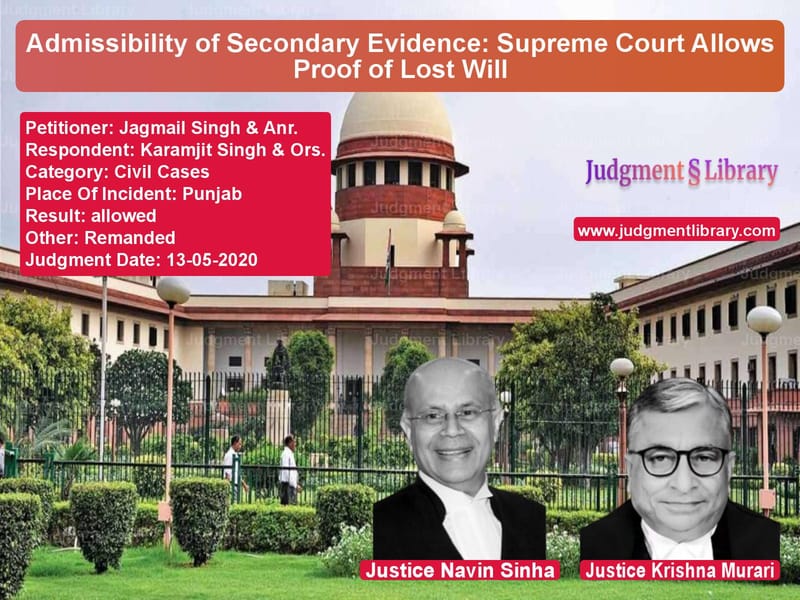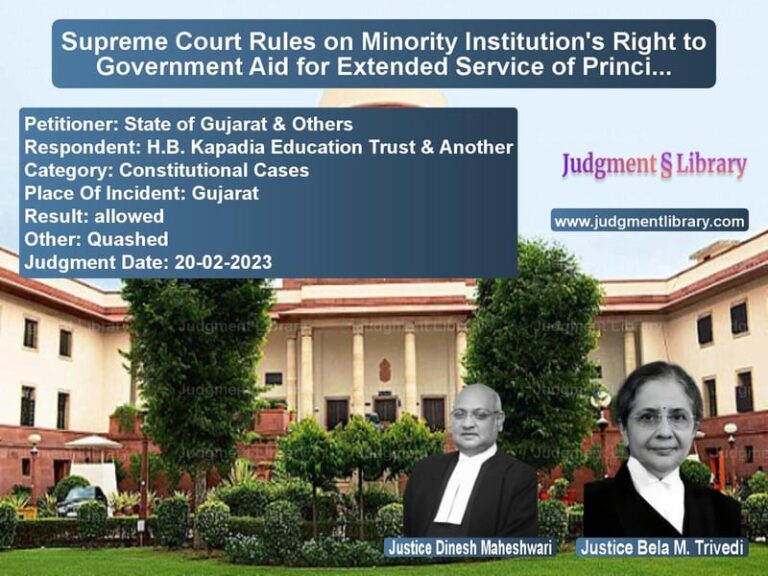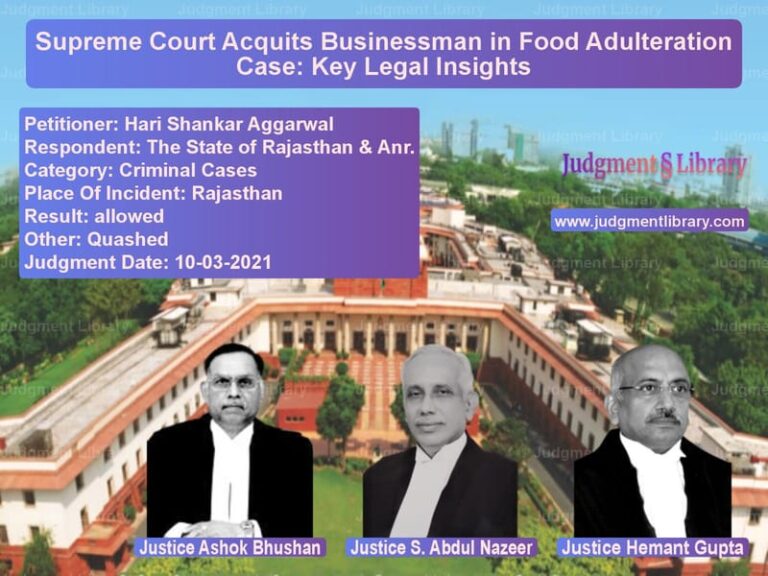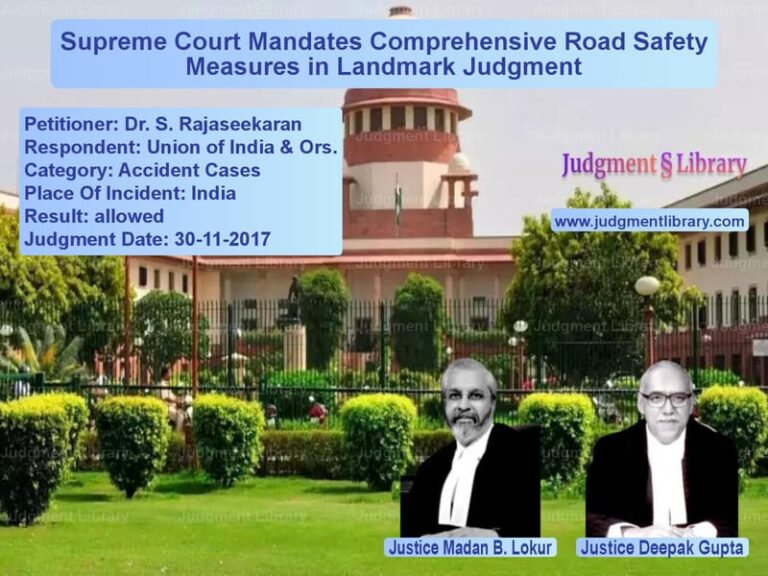Admissibility of Secondary Evidence: Supreme Court Allows Proof of Lost Will
The case of Jagmail Singh & Anr. vs. Karamjit Singh & Ors. revolves around a dispute concerning the admissibility of secondary evidence when the original document is lost. The Supreme Court was called upon to determine whether the appellants could prove a lost Will through secondary evidence after failing to retrieve the original from revenue officials.
Background of the Case
The appellants, Jagmail Singh and another, filed a suit claiming ownership of land based on a Will dated January 24, 1989, executed by Babu Singh. They challenged the validity of two mutations dated February 28, 1991, and February 25, 1991, in favor of the respondents, alleging that the mutations were based on a forged Will.
During the proceedings, the appellants sought to prove the 1989 Will by way of secondary evidence, as the original was allegedly handed over to the village patwari for mutation and could not be retrieved. The Trial Court initially allowed the application under Sections 65 and 66 of the Indian Evidence Act, permitting secondary evidence. However, the High Court later overturned this decision, holding that the existence of the original Will was not sufficiently established.
Key Issues
- Was the loss of the original Will sufficiently proven?
- Did the appellants fulfill the requirements under Sections 65 and 66 of the Indian Evidence Act for secondary evidence?
- Could the High Court deny secondary evidence solely on the basis that the Will’s existence was unproven?
Arguments of the Petitioners (Jagmail Singh & Anr.)
The petitioners contended that:
- The original Will was handed over to the village patwari for mutation proceedings and was lost thereafter.
- They had served a notice under Section 66 of the Indian Evidence Act to the revenue officials to produce the original Will, but the officials failed to do so.
- Under Section 65(a) of the Evidence Act, secondary evidence is permissible when the original is in possession of someone who fails to produce it despite notice.
- The scribe of the Will and other witnesses had confirmed its execution, establishing its existence.
Arguments of the Respondents (Karamjit Singh & Ors.)
The respondents countered that:
- The appellants had not conclusively proven that the original Will ever existed.
- Both revenue officials who were issued notices failed to confirm having received the Will.
- Under the Indian Evidence Act, the existence of the original document must be established before secondary evidence can be admitted.
- The High Court had rightly denied secondary evidence as the pre-requisite condition of proving the Will’s existence was not met.
Supreme Court’s Judgment
The Supreme Court overturned the High Court’s decision and allowed the appellants to present secondary evidence. The key observations were:
1. Legal Standard for Secondary Evidence
The Court reaffirmed that secondary evidence can be permitted if the original document is lost and efforts to retrieve it have been made:
“For secondary evidence to be admitted, foundational facts must be established, explaining why the original cannot be produced. The appellants have demonstrated that the original Will was given to the revenue officials and was lost thereafter.”
2. Failure of Revenue Officials to Produce the Will
The Court noted that the appellants had served a notice to the revenue officials under Section 66 of the Evidence Act, but the officials failed to produce the document:
“Where a party has issued notice under Section 66 for production of the original, and the custodian fails to produce it, the requirement for secondary evidence under Section 65(a) is satisfied.”
3. High Court’s Error in Rejecting Secondary Evidence
The Court found that the High Court had erred in ruling that the existence of the original Will had to be proven before secondary evidence could be allowed:
“Existence of the original document is a question of fact that can be established through evidence during trial. Denying the opportunity to prove the Will through secondary evidence at the outset was incorrect.”
4. Right to Fair Trial
The Supreme Court emphasized that denying secondary evidence at an early stage would deprive the appellants of their right to a fair trial:
“Once secondary evidence is admitted, its genuineness and credibility must still be evaluated during trial. The High Court erred in preventing this process.”
Final Verdict
The Supreme Court allowed the appeal, ruling that:
- The appellants are entitled to lead secondary evidence for proving the 1989 Will.
- The High Court’s order was set aside as it improperly restricted evidence presentation.
- Admission of secondary evidence does not automatically prove the Will’s authenticity; it must still be tested during trial.
Impact of the Judgment
This ruling has significant implications for property disputes and the admissibility of secondary evidence:
- It clarifies that secondary evidence can be admitted if efforts to retrieve the original document have failed.
- It reaffirms the principle that courts should not summarily reject secondary evidence if procedural requirements are met.
- It ensures that litigants are given a fair opportunity to prove their claims in property disputes.
- It strengthens procedural fairness by preventing overly rigid interpretations of evidence laws.
Conclusion
The Supreme Court’s judgment in Jagmail Singh & Anr. vs. Karamjit Singh & Ors. sets a crucial precedent on the admissibility of secondary evidence. By overturning the High Court’s decision, the ruling safeguards litigants’ rights to prove lost documents through legitimate means. This decision ensures that technicalities do not obstruct substantive justice and upholds the fair trial principle in civil disputes.
Petitioner Name: Jagmail Singh & Anr..Respondent Name: Karamjit Singh & Ors..Judgment By: Justice Navin Sinha, Justice Krishna Murari.Place Of Incident: Punjab.Judgment Date: 13-05-2020.
Don’t miss out on the full details! Download the complete judgment in PDF format below and gain valuable insights instantly!
Download Judgment: Jagmail Singh & Anr. vs Karamjit Singh & Ors Supreme Court of India Judgment Dated 13-05-2020.pdf
Direct Downlaod Judgment: Direct downlaod this Judgment
See all petitions in Property Disputes
See all petitions in Succession and Wills
See all petitions in Contract Disputes
See all petitions in Damages and Compensation
See all petitions in Landlord-Tenant Disputes
See all petitions in Judgment by Navin Sinha
See all petitions in Judgment by Krishna Murari
See all petitions in allowed
See all petitions in Remanded
See all petitions in supreme court of India judgments May 2020
See all petitions in 2020 judgments
See all posts in Civil Cases Category
See all allowed petitions in Civil Cases Category
See all Dismissed petitions in Civil Cases Category
See all partially allowed petitions in Civil Cases Category







